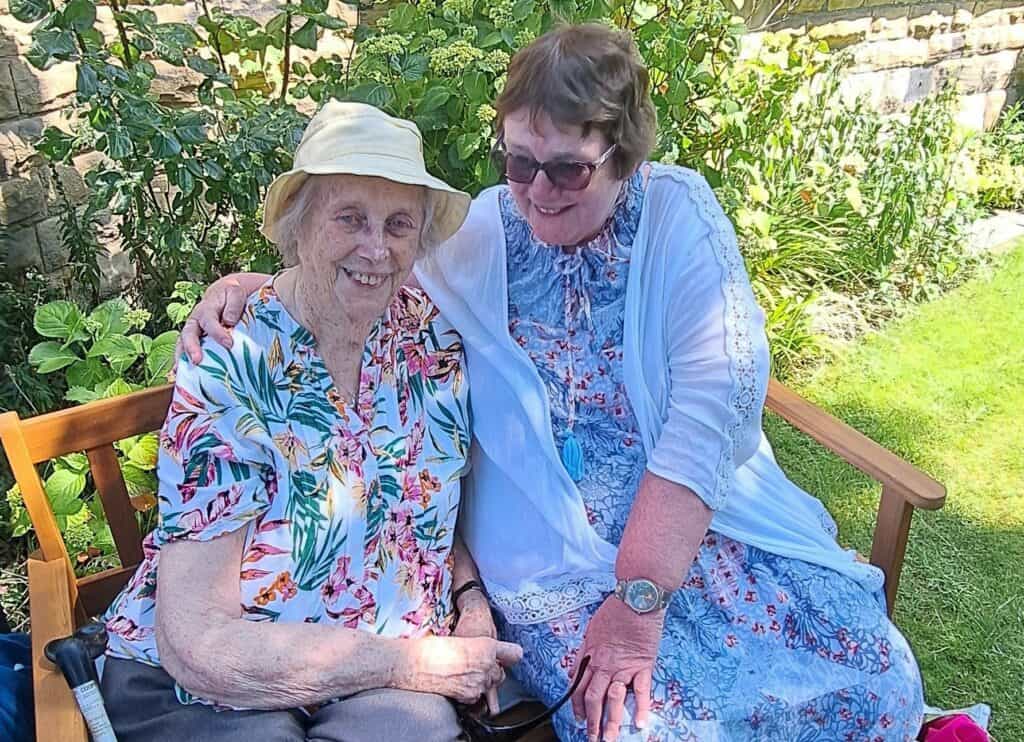What’s so scary about moving into a care home?

Author: Pilgrims' Friend Society
Supporting someone in their move to a care home can be an emotionally challenging time. In her latest blog for Faith in Later Life, Helen Nathan at Pilgrims’ Friend Society shares Jane and Joan’s story, and some helpful insights into making this significant transition.
Moving is a big change at any stage in life. When you are older, frailer and possibly not very well, the thought of leaving the security of your own home and moving into a care home to live alongside others can feel enormous and, let’s face it, downright scary.
In my time at Pilgrims’ Friend Society, I’ve also spoken to lots of relatives, often key decision-makers, about the worries they’ve had. These have included: will my relative be well looked after/ make friends/ be able to keep up with old friends/ see family/ be bored/ feel deserted/ miss their old home and church/ lose their independence entirely/ go downhill healthwise?
Feelings of guilt are common and negative attitudes to care homes in the media and society at large certainly don’t help. The line ‘please don’t put me in a home’ feels like every scriptwriter’s go-to. Such attitudes are internalised and echoed. I can only imagine how painful it must be to hear these words from an older relative as you weigh up what to do for the best.
Sadly, there are some poor providers out there. But by and large the care sector is populated by wonderful people who see caring as a vocation. Care homes aren’t the terrible places some would have us believe. Moving to a care home will be a big change, yes, but there are plenty of things you can do to help ally fears.
Going for a visit where you can talk to staff and see the environment for yourself is important. A respite stay can also be extremely helpful, as this will allow your relative to experience first-hand what it’s like to actually live there. For a Christian, being in an environment where they can live out their faith and find fellowship with others can make an enormous difference.
Recently, I spoke to Jane about her experience of finding a care home for her mother Joan. For the family, a respite stay played a big part in their eventual decision for Joan to move to Emmaus House in Harrogate which, like all our care homes, is underpinned by the Christian faith.
Joan had been living with Jane and her husband at their home in Wakefield, having moved in during the pandemic. Joan suffers from macular degeneration and could no longer live safely independently. Jane and her husband were doing their best to care for Joan while juggling grandparent responsibilities but were starting to feel the strain, especially as Jane’s husband also suffers from a health condition.
In need of a break herself, Jane began searching for options for respite care for Joan and that’s when she came across Emmaus House. “The staff were so kind and welcoming it just felt right,” says Jane. “When Mum came back a week later she literally had a spring in her step. There were so many little things that made a difference. Staff took the time to read the Bible to her as she can no longer see to read it for herself. They also understood that she is mentally very sharp. For example, the manager found out that Mum knows a lot about puffins and suggested she give a talk for the other residents.”
One fear that Joan had about being in a care home was not being able to recognise people. Because Emmaus House is a small 22-bed care home, she was quickly able to get to know different the team by their voices which made her feel safe and secure. The respite stay was such a success that Joan said she would be happy to live there one day.
When the time came for a permanent move, the process was not entirely straightforward. The family were reliant on Joan’s care home place being funded in part by the local authority and as they lived in Wakefield the council had to be satisfied that nothing would meet Joan’s needs locally.
“Mum did have a wobble at this point. When she found out the care home she went to might not be Emmaus, she said she’d rather not go to a care home at all,” says Jane. However, having seen how Joan had thrived while there on respite, the family could confidently make their case to the local council who visited the home and, seeing its spiritual focus, could only agree it was the best place for her to be.
For Jane, the feelings of guilt she experienced after the move did not abate straightaway.
“I was plagued by this idea that people only end up in care homes because their children can’t be bothered to look after them. I spent about a week crying,” she says.
However, now Jane is certain it was the right choice. “Mum is well looked after and there are people around all day to talk to and even pray with if she wants. She is an extrovert and loves it. I can see that Emmaus House can provide for her in lots of way that I can’t. But it’s not a choice, either family or the care home. Actually, she can have both.”
Far from being boring, a care home can be a place to experience new things. Jane describes how the daily activities at Emmaus House are helping Joan to find a new lease of life. “The home has a weekly carpet bowls tournament and the other day the manager sent me a photo of Mum holding up the winner’s trophy. I couldn’t it believe but apparently Mum’s learnt to listen to the trajectory of where the bowls are going and works it out from that. It’s incredible!”
As the experience of Joan and Jane demonstrates, doing some research can go a long way to easing the process. And for a believer especially, knowing you are going to be in an environment that is truly Christian and person-centred can help to allay any fears and help you to see a care home move as something to be looked forward to rather than something to be feared.
To find out more about the Christian care homes provided by Pilgrims’ Friend Society, please visit: www.pilgrimsfriend.org.uk/care-homes
25/07/24
